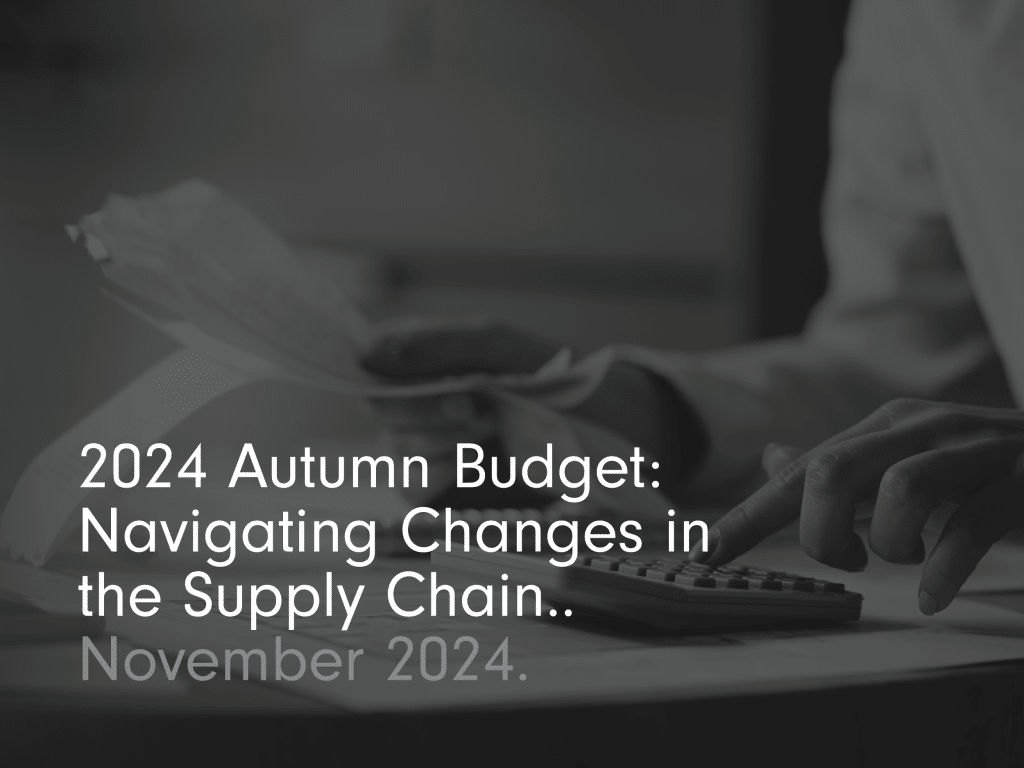2024 Autumn Budget: Navigating Changes in the Supply Chain.

The 2024 UK Autumn Budget, announced by Chancellor Rachel Reeves on 30 October, is set to reshape the UK economy with significant investment in infrastructure projects, clean energy, and industrial strategy. The Autumn Budget and the supply chain hold a critical place in these plans, as the focus on sustainable growth, digital transformation, and regional development brings both challenges and opportunities for supply chains and businesses. Below, we explore the key impacts on supply chains and offer strategies to help businesses adapt to the new fiscal environment.
1. Adapting to Higher Staffing Costs.
- Impact: The minimum wage increase to £12.21 per hour from April 2025, combined with higher employer National Insurance (NI) contributions, will add to staffing costs across industries. This change impacts sectors with labour-intensive roles, such as warehousing and logistics, and may strain profit margins.
Strategies:
- Invest in Automation: Automation for repetitive tasks, such as warehouse management, can reduce dependency on manual labour. Advanced digital technologies like AI-driven analytics and robotics help offset higher wage costs by enhancing productivity.
- Optimise Workforce Utilisation: Flexible shifts, outsourcing, and upskilling employees to handle multiple roles can reduce the number of workers needed. These strategies will help businesses streamline operations and adjust to increased wage pressures.

2. Managing Rising Fuel and Operational Costs.
- Impact: Although the government has extended the temporary 5p per litre fuel duty reduction, transportation costs remain a major expense. With other operational costs rising, businesses need efficient solutions to manage expenses.
Strategies:
- Route Optimisation: Use digital tools to optimise delivery routes, which reduces fuel consumption. Some companies are also considering electric or hybrid fleets, which involve upfront costs but provide long-term savings and support the budget’s clean energy goals.
- Shared Logistics: Collaborative transportation models, such as shared delivery routes, can help reduce costs. By sharing routes, companies can minimise fuel consumption and lower expenses, contributing to more resilient and sustainable supply chains.

3. Leveraging Infrastructure and Investment Zones.
- Impact: With NISTA (National Infrastructure and Service Transformation Authority) overseeing infrastructure development, the government aims for effective delivery of infrastructure across the country. New Investment Zones and Freeports are expected to promote free and open trade, with tax incentives and funding to stimulate regional growth.
Strategies:
- Take Advantage of Regional Incentives: Companies operating near Investment Zones can benefit from tax breaks, grants, and reduced regulatory requirements. This is especially beneficial for small and medium-sized enterprises (SMEs) looking to expand operations in these areas.
- Digital Infrastructure Investment: With funding for the Made Smarter programme, SMEs can upgrade technology and adopt digital solutions. Digitalisation improves inventory management, demand forecasting, and enhances overall supply chain resilience.

4. Aligning with Clean Energy and Carbon Capture Initiatives.
- Impact: A £3.9 billion allocation for clean energy and carbon capture projects aligns with the UK’s net-zero goals. Investments in hydrogen production and sustainable fuels are part of the government’s commitment to reducing emissions in high-energy sectors such as logistics and manufacturing.
Strategies:
- Adopt Green Technologies: Switching to energy-efficient technologies, such as LED lighting and eco-friendly HVAC systems, can reduce operational costs over time. Renewable energy sources should also be considered where feasible to cut costs and contribute to sustainability.
- Access Sustainability Grants: Take advantage of government-backed grants aimed at supporting clean energy and sustainable practices. Carbon-offsetting programmes are another option for companies that can’t immediately transition to low-carbon operations.
5. Addressing Digital Transformation and Cybersecurity Concerns.
- Impact: The budget supports the Made Smarter programme, which offers £37 million to help SMEs adopt advanced digital technologies. However, a lack of cybersecurity funding leaves digitalised supply chains vulnerable to cyber threats.
Strategies:
- Cybersecurity Investments: To protect data and ensure operational continuity, businesses should prioritise cybersecurity training and tools. This includes implementing updated security protocols and investing in advanced cybersecurity solutions.
- Use Funding for Digital Upgrades: The SME Digital Adoption Taskforce under the Made Smarter programme offers an opportunity for SMEs to enhance their digital capabilities, including automation, data analytics, and AI. This will help them stay competitive despite rising costs

Adapting to the New Fiscal Landscape.
In conclusion, while the 2024 Autumn Budget imposes immediate pressures, it also opens doors for innovation and resilience in UK supply chains. With focused investments in automation, clean energy, and digital infrastructure, companies can navigate these challenges effectively and align with the government’s long-term vision for economic growth. By embracing these strategies, businesses will be better positioned to thrive in a changing economic landscape and contribute to a stronger, more sustainable UK economy.
Frequently Asked Questions.
The 2024 Autumn Budget, presented by Chancellor Rachel Reeves, prioritises infrastructure projects, clean energy, and supporting SMEs through digital transformation. The budget’s focus on economic growth, industrial strategy, and sustainability aims to strengthen UK supply chains by modernising infrastructure, improving regional productivity, and facilitating clean energy adoption. However, businesses will need to manage increased costs from higher wages and National Insurance contributions, especially in labour-intensive sectors like logistics.
The minimum wage increase to £12.21 per hour and adjustments to National Insurance contributions mean that businesses will face higher labour costs starting in April 2025. This is particularly impactful for small and medium-sized enterprises (SMEs) and sectors with large workforces. Businesses can offset some of these costs by investing in automation and workforce optimisation.
NISTA is a new entity introduced in the budget to oversee effective infrastructure delivery across the UK. By streamlining processes and ensuring timely project completion, NISTA aims to reduce logistical barriers and enhance regional productivity. Improved infrastructure will benefit businesses by providing more reliable transportation and reducing bottlenecks in the supply chain.
The budget provides £37 million in additional funding for the Made Smarter programme, which helps SMEs adopt advanced digital technologies. Through this funding, SMEs can invest in tools like data analytics, automation, and cybersecurity measures. This aligns with the government’s industrial strategy to boost competitiveness and efficiency in supply chains by facilitating digital adoption
The budget allocates £3.9 billion towards clean energy initiatives, including carbon capture, hydrogen production, and sustainable fuel research. These initiatives support the UK’s net-zero objectives, and businesses can leverage grants and incentives to invest in eco-friendly technologies. This funding will also help high-energy sectors, such as manufacturing and logistics, to reduce emissions and transition to more sustainable practices.